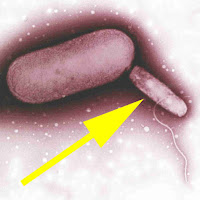This episode: Proteins from gut bacteria seems to affect hunger and satiety in their (rodent) hosts!
Download Episode (7.7 MB, 8.3 minutes)
Show notes:
News item 1/
News item 2
Journal Paper:
Breton J, Tennoune N, Lucas N, Francois M, Legrand R, Jacquemot J, Goichon A, Guérin C, Peltier J, Pestel-Caron M, Chan P, Vaudry D, do Rego J-C, Liénard F, Pénicaud L, Fioramonti X, Ebenezer IS, Hökfelt T, Déchelotte P, Fetissov SO. 2016.
Gut Commensal E. coli Proteins Activate Host Satiety Pathways following Nutrient-Induced Bacterial Growth. Cell Metab
23:324–334.
Other interesting stories:
Now even bacteria could make opiates
Soil bacteria slime could help make wound dressings
CRISPRs targeting phage RNA instead of DNA can have some benefits for cells
Engineering biotech pathways for better processes
Bacteria can produce antimicrobial silver nanoparticles (paper)
Post questions or comments here or email to
bacteriofiles@gmail.com. Thanks for listening!








